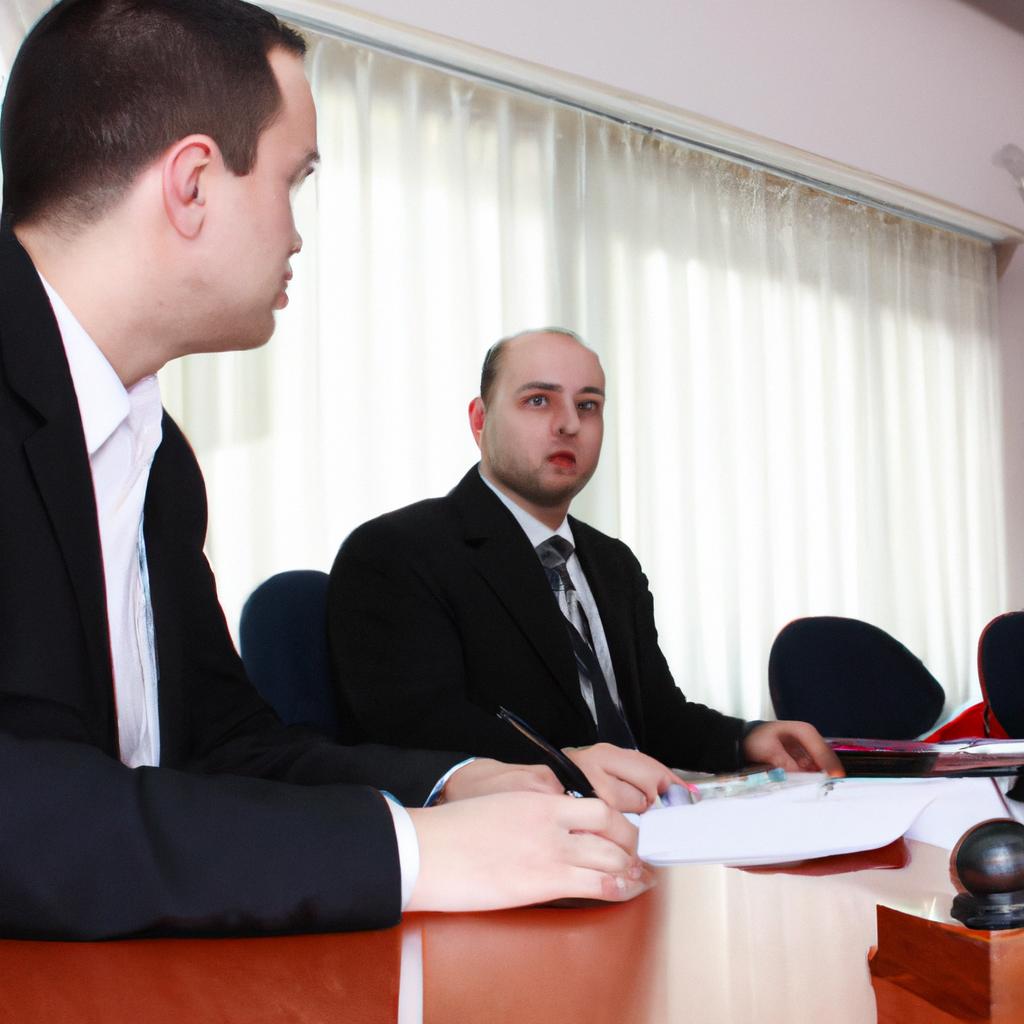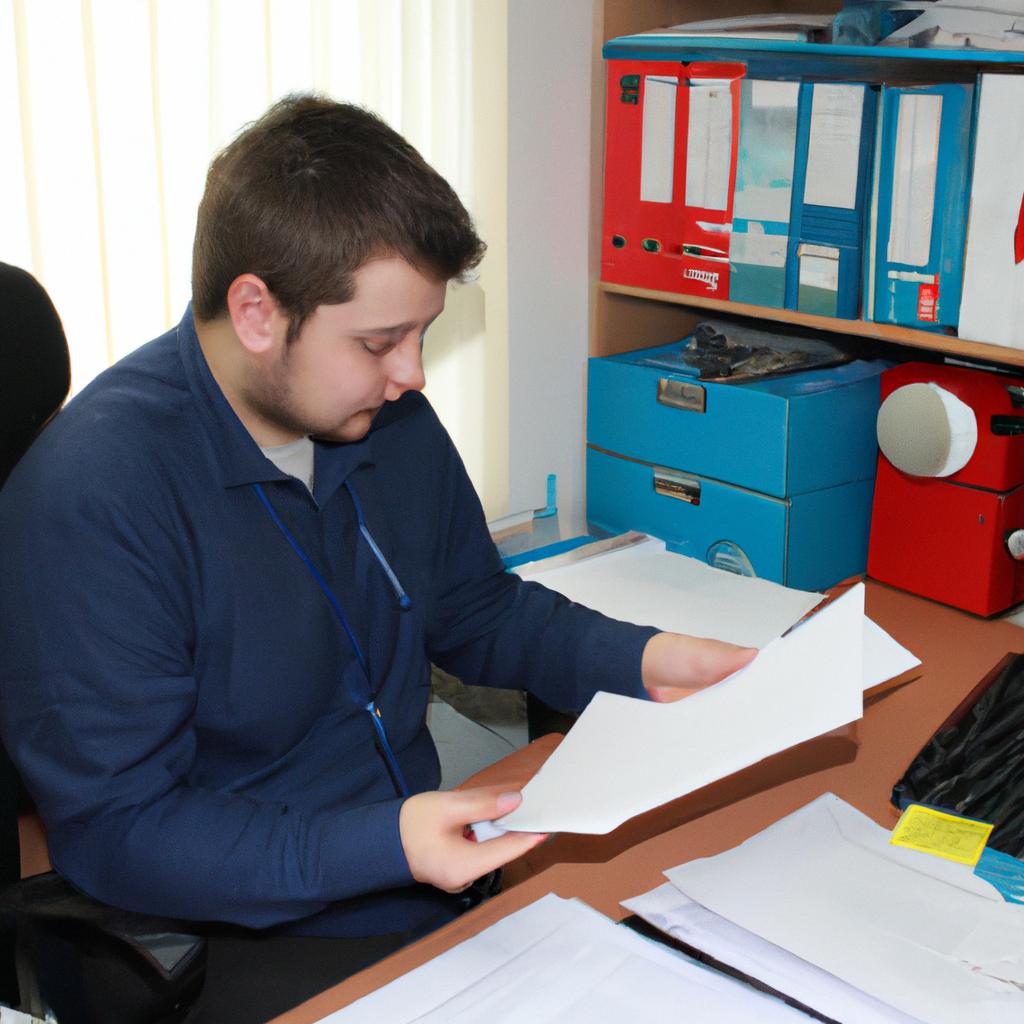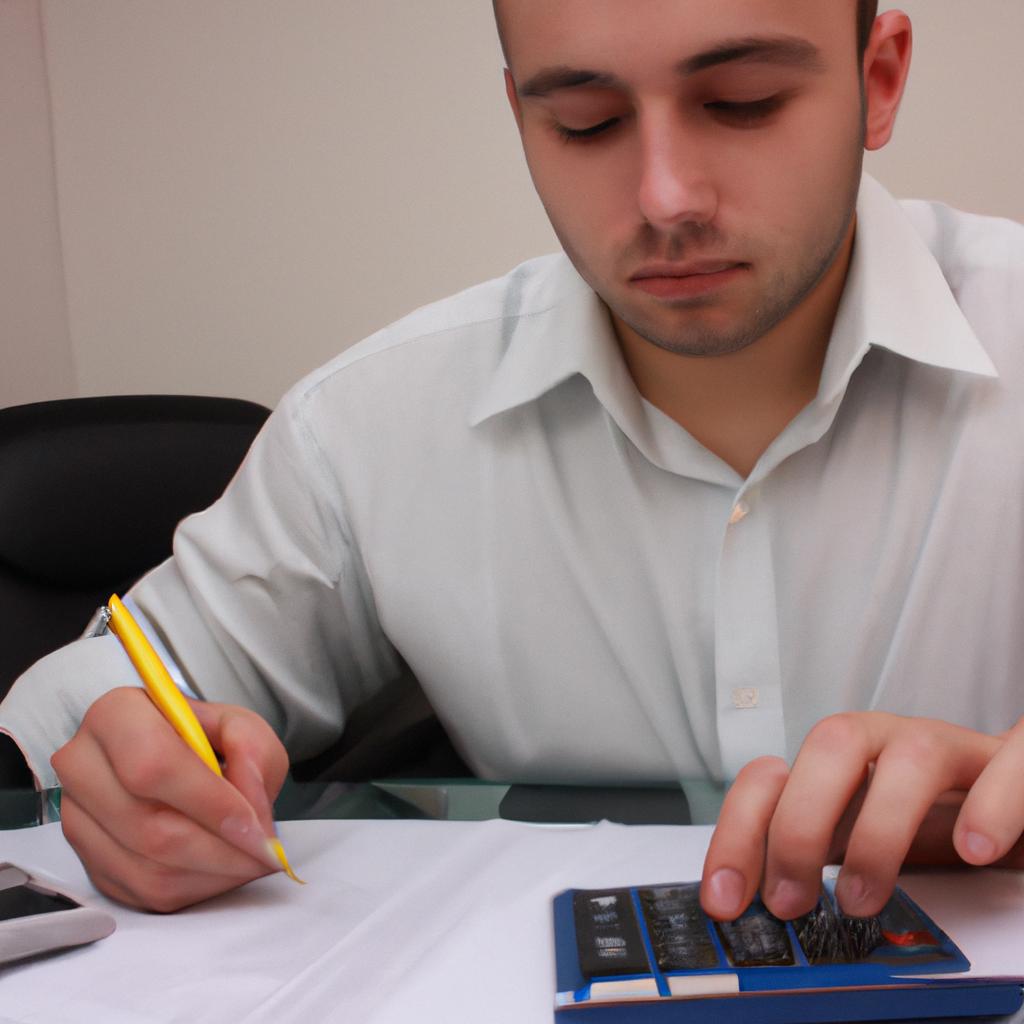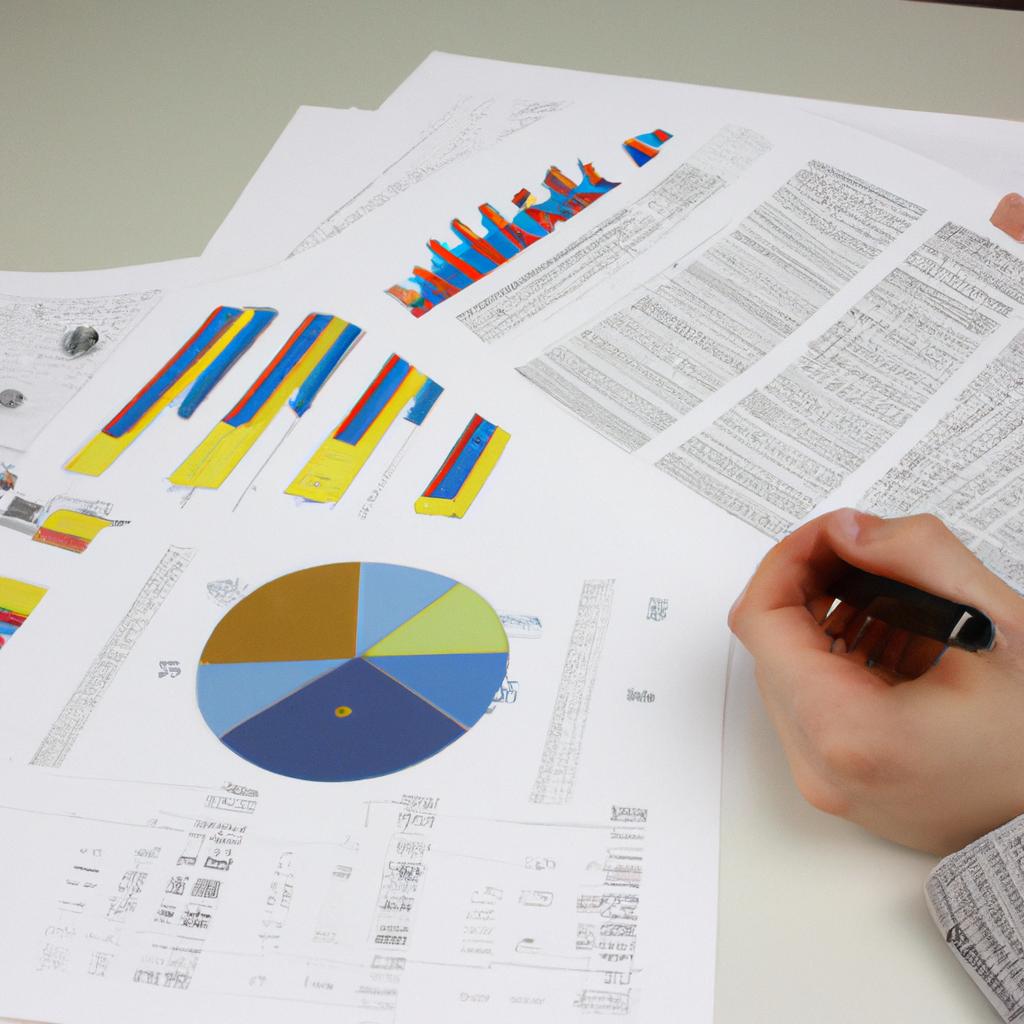Expert Witness Testimony in Business Appraisal and Services: A Guide to Litigation Support

In the realm of litigation support, expert witness testimony plays a crucial role in providing objective and specialized opinions to assist courts in making informed decisions. This guide aims to delve into the significance of expert witness testimony specifically within the context of business appraisal and services. By examining real-life scenarios and hypothetical case studies, this article seeks to shed light on the complexities involved in utilizing expert witnesses to navigate legal disputes related to business valuation.
One such example involves a high-stakes dispute between two major corporations regarding the value of an intellectual property asset. In this scenario, both parties presented their own appraisals that differed significantly in terms of methodology and resulting valuations. As a result, the court enlisted the expertise of an experienced business appraiser as an expert witness to provide an impartial evaluation. Through rigorous analysis, comprehensive research, and utilization of industry best practices, the expert witness was able to present compelling evidence supporting their independent assessment of the asset’s value. The subsequent impact on the court’s decision highlighted not only the importance but also the intricate nature of expert witness testimony in resolving complex matters pertaining to business appraisal and services.
With these insights at hand, it becomes evident that understanding how expert witness testimony functions within the realms of business appraisal is vital for attorneys seeking effective litigation strategies. By leveraging the expertise of a qualified expert witness, attorneys can bolster their case by presenting objective and well-supported opinions that carry weight in court.
Expert witness testimony in business appraisal cases can provide several benefits. Firstly, it helps to bridge the gap between legal concepts and the technical complexities of business valuation. Business appraisal involves intricate methodologies, financial analysis, industry knowledge, and regulatory considerations that may be unfamiliar to many legal professionals. Expert witnesses with specialized knowledge in these areas can explain complex concepts in a clear and understandable manner for the court.
Secondly, expert witnesses bring credibility to the table. Their qualifications, experience, and reputation as trusted authorities in their field lend weight to their opinions and findings. This credibility is especially important when opposing parties present conflicting appraisals or valuations. The court relies on expert witnesses to independently evaluate the evidence presented and offer an unbiased assessment based on their expertise.
Moreover, expert witnesses can aid in debunking flawed methodologies or biased assessments presented by opposing parties. They are trained to critically analyze the various approaches used for business valuation and identify any weaknesses or inconsistencies. By highlighting flaws or biases in opposing appraisals, expert witnesses strengthen the reliability of their own evaluation.
Furthermore, expert witness testimony plays a vital role in determining damages or quantifying losses suffered by businesses during litigation. Whether it involves calculating lost profits due to breach of contract or determining fair compensation for intellectual property infringement, an expert witness with expertise in business valuation can provide an accurate assessment based on accepted industry standards.
In summary, understanding the significance of expert witness testimony within the context of business appraisal is crucial for attorneys involved in litigation related to business valuation disputes. Utilizing the specialized knowledge and objective opinions provided by qualified expert witnesses enhances the chances of achieving favorable outcomes for clients by providing courts with reliable information upon which they can make informed decisions.
Role of an Expert Witness
An expert witness plays a crucial role in the context of business appraisal and services, providing valuable insights and opinions based on their specialized knowledge and experience. In litigation cases involving complex financial matters or disputes, such as determining the value of a company or assessing damages, expert witnesses are called upon to provide objective analysis and testimony.
For instance, consider a hypothetical case where two parties are engaged in a legal dispute regarding the valuation of a closely held corporation for purposes of selling minority shares. The court may appoint an independent expert witness with expertise in business appraisal to assist in evaluating the fair market value of the shares. This expert will be responsible for conducting thorough research, analyzing relevant financial data, applying appropriate valuation methodologies, and ultimately presenting their findings in court.
Expert witnesses serve as trusted advisors who bridge the gap between technical complexity and lay understanding. They assist judges, juries, attorneys, and other stakeholders by translating intricate financial concepts into clear explanations that can be comprehended by non-experts. To achieve this goal effectively, they often employ various communication techniques such as using visual aids like bullet point lists or tables to present complex information concisely.
To illustrate further how an expert witness fulfills their role, let us consider some key aspects:
- Impartiality: An expert witness is expected to maintain neutrality throughout the proceedings and offer unbiased opinions based solely on professional judgment.
- Credibility: Expert witnesses must possess extensive knowledge and experience within their field of expertise to establish credibility among all parties involved.
- Adherence to standards: They follow established professional guidelines (e.g., Uniform Standards of Professional Appraisal Practice) when performing assessments or valuations.
- Effective communication: Expert witnesses have excellent verbal and written communication skills enabling them to convey complex ideas clearly and persuasively.
By fulfilling these responsibilities, an expert witness contributes significantly to the judicial process by providing reliable evidence that helps courts make informed decisions. In the subsequent section, we will delve into the qualifications and credentials necessary for an individual to serve as an expert witness in business appraisal and services cases.
Qualifications and Credentials of an Expert Witness
Building upon the understanding of the role an expert witness plays in litigation, it is important to examine the qualifications and credentials necessary for individuals to fulfill this crucial role effectively.
To demonstrate expertise and credibility, expert witnesses must possess certain qualifications and credentials. These requirements help ensure that they possess the necessary knowledge, experience, and objectivity to provide reliable testimony. For instance, consider a hypothetical case involving a business dispute where a certified public accountant (CPA) with extensive experience in forensic accounting is called upon as an expert witness. This individual’s qualifications may include:
- Advanced certifications: In addition to being a CPA, the expert witness might hold specialized certifications such as Accredited in Business Valuation (ABV), Certified Fraud Examiner (CFE), or Certified Forensic Financial Analyst (CFFA). These designations signify their expertise in specific areas relevant to the case.
- Education and training: The expert witness should have relevant educational background and ongoing professional development activities within their field of expertise. This could include advanced degrees, continuing education courses, or specialized training programs.
- Experience: Practical experience is paramount for an expert witness. They should have substantial hands-on experience dealing with similar matters through their work history or engagements on previous cases.
- Professional reputation: A strong professional reputation enhances the credibility of an expert witness. Factors like publications, speaking engagements at industry conferences, memberships in professional organizations related to their field of expertise all contribute towards building a positive reputation.
These qualifications and credentials serve as indicators of an expert witness’s competence and reliability. Attorneys rely on them when selecting experts who can assist in presenting complex financial issues clearly during trial proceedings.
| Qualification/Credential | Description |
|---|---|
| Advanced Certifications | Designations highlighting specialized expertise such as ABV, CFE, or CFFA |
| Education & Training | Relevant academic background and continued education or training in the field |
| Experience | Practical experience handling similar matters through previous work or cases |
| Professional Reputation | Recognition through publications, speaking engagements, and memberships |
By meeting these qualifications and credentials, expert witnesses can offer valuable insights to the court that help judges and juries make informed decisions. In the subsequent section about “Admissibility of Expert Witness Testimony,” we will explore how courts evaluate the suitability and reliability of expert witness testimony, ensuring only credible evidence is presented during litigation proceedings.
Admissibility of Expert Witness Testimony
Expert Witness Testimony: Admissibility and Challenges
In a recent high-profile case involving a multinational corporation, the admissibility of expert witness testimony played a crucial role in determining the outcome. The plaintiff’s expert witness, a seasoned business appraiser with extensive credentials, provided compelling evidence to support their valuation of the company. However, the defense argued that the expert lacked specific qualifications related to certain industry practices, raising concerns about the reliability and relevance of their testimony. This example underscores the importance of understanding the admissibility criteria for expert witnesses in litigation.
When evaluating the admissibility of expert witness testimony, courts consider various factors to ensure its reliability and relevance. These criteria aim to prevent unqualified individuals from offering opinions beyond their expertise or presenting speculative theories without sufficient basis. To meet these requirements, experts should possess relevant qualifications such as education, training, work experience, certifications, and professional affiliations within their field. Additionally, they must demonstrate familiarity with recognized principles and methodologies commonly used in business appraisal and services.
Challenges may arise when opposing parties challenge an expert’s qualifications or attempt to exclude their testimony altogether. It is essential for expert witnesses to anticipate potential challenges by thoroughly assessing their own credentials beforehand. By addressing any deficiencies proactively through continuing education or collaboration with colleagues who possess complementary expertise, experts can enhance their credibility and increase the likelihood of having their testimony admitted into court proceedings.
Admissibility Criteria for Expert Witness Testimony:
- Qualifications: Demonstrated expertise through education,
training, experience, certifications. - Relevance: Ability to offer insights directly related to
the subject matter at hand. - Reliability: Use of reliable methods and sound reasoning
based on established industry standards. - Lack of Bias: Impartiality demonstrated through ethical
conduct and avoidance of conflicts of interest.
| Qualifications | Relevance | Reliability | Lack of Bias |
|---|---|---|---|
| Education | Subject Matter | Methodologies | Ethical Conduct |
| Training | Expertise | Standards | Conflict Avoidance |
| Experience | Reasoning | ||
| Certifications |
As expert witness testimony plays a pivotal role in litigation support, understanding the admissibility criteria and potential challenges is crucial for professionals involved in business appraisal and services. By ensuring their qualifications align with industry standards, experts can enhance their credibility and provide valuable insights that assist courts in making informed decisions.
“With a solid understanding of the admissibility requirements for expert witness testimony, the next step is preparing effectively to present compelling evidence.”
Preparing Expert Witness Testimony
Section H2: Admissibility of Expert Witness Testimony
In a legal setting, the admissibility of expert witness testimony plays a crucial role in determining its relevance and reliability. The court must assess whether the proffered expert testimony meets certain criteria before allowing it to be presented to the jury. Understanding these requirements is essential for both attorneys seeking to present expert witnesses and experts themselves.
For instance, consider a hypothetical case where an accountant has been called upon as an expert witness in a business valuation dispute. The opposing party objects to the admission of the accountant’s testimony on grounds that it does not meet the necessary standards for admissibility. In this situation, adherence to established guidelines becomes vital in ensuring that the expert’s opinion holds weight in court.
To help determine whether expert witness testimony should be admitted, courts often refer to a set of key factors:
- Qualifications: The court will examine the qualifications and expertise of the proposed expert witness. Their educational background, professional experience, certifications, and prior testimonial experience are considered.
- Methodology: Courts evaluate whether the methodology employed by the expert is reliable and accepted within their field. They assess if it has been tested or subjected to peer review.
- Relevance: The court determines whether the proposed testimony is relevant to assist the trier of fact in understanding complex issues or reaching conclusions beyond their common knowledge.
- Reliability: This factor focuses on whether there is sufficient factual basis for the opinions offered by the expert witness. It includes assessing data quality, analytical techniques used, and consideration of alternative interpretations.
Table 1 below provides examples of cases where challenges arose regarding admissibility criteria for expert witness testimony:
| Case Name | Jurisdiction | Issue |
|---|---|---|
| Johnson v. Smith | Federal | Lack of proper qualification |
| Gonzalez et al. v. Lee | State | Methodology not widely accepted |
| Thompson v. Blackwell | State | Relevance to case questioned |
| Roberts v. Johnson | Federal | Reliability of data and analysis scrutinized |
In summary, the admissibility of expert witness testimony hinges on several factors that ensure its reliability and relevance to the matter at hand. The court’s assessment considers qualifications, methodology, relevance, and reliability as crucial criteria. By meeting these standards, an expert witness can increase their likelihood of having their testimony admitted in court.
Transitioning into the next section about “Preparing Expert Witness Testimony,” it is essential for both attorneys and experts to understand the necessary steps involved in presenting this testimony effectively.
Presenting Expert Witness Testimony
Section H2: Presenting Expert Witness Testimony
Having discussed the process of preparing expert witness testimony, we now shift our focus to its presentation in a courtroom setting. To illustrate this further, let us consider a hypothetical case study involving a business valuation dispute between two parties.
Case Study Example:
In Smith v. Johnson, an ongoing legal battle over the value of a small manufacturing company has reached the trial phase. The plaintiff argues that the defendant undervalued their shares during a buyout transaction, causing financial harm. As part of their litigation strategy, both sides have retained expert witnesses proficient in business appraisal and services to provide testimonies supporting their respective claims.
Presentation Strategies for Effective Expert Witness Testimony:
-
Clear and concise communication: When presenting expert witness testimony, it is crucial to articulate complex concepts and findings in a manner accessible to laypersons on the jury. Utilizing simple language and avoiding technical jargon can enhance comprehension and facilitate effective communication.
-
Visual aids: Incorporating visual aids such as charts, graphs, or tables can significantly augment the clarity and impact of expert witness testimonies. These visuals help jurors visualize data trends, comparisons, or any other relevant information that may influence their understanding and decision-making process.
-
Demonstrative evidence: Alongside visual aids, demonstrative evidence plays a vital role in engaging juror attention and conveying key points effectively. Using exhibits like photographs, models, or simulations can make abstract information more tangible and relatable to the case at hand.
-
Professional demeanor: Maintaining professionalism throughout the presentation is paramount for establishing credibility as an expert witness. Displaying confidence, composure, and impartiality reinforces trustworthiness among jurors who rely heavily on these qualities when evaluating testimonial evidence.
Table – Factors Influencing Juror Perception:
| Factor | Effect |
|---|---|
| Confidence | Enhances credibility |
| Clarity of testimony | Improves understanding |
| Use of visual aids | Increases engagement |
| Professional demeanor | Bolsters trustworthiness |
As we have explored various strategies for presenting expert witness testimonies effectively, it is essential to recognize that challenges and cross-examinations often arise during this process. In the following section, we will delve into these critical aspects in more detail.
Please proceed to Section H3: Challenges and Cross-Examination of Expert Witnesses.
Challenges and Cross-Examination of Expert Witnesses
Section H2: Challenges and Cross-Examination of Expert Witnesses
Transitioning from the previous section on presenting expert witness testimony, it is imperative to explore the challenges and cross-examinations faced by these individuals in litigation support. Understanding how expert witnesses may be scrutinized during cross-examination provides valuable insights into the rigorous nature of their work. To illustrate this point, let us consider a hypothetical scenario involving a business appraisal case where an expert witness is called upon to testify.
In our hypothetical case, Company A is involved in a legal dispute regarding its valuation for acquisition purposes. The opposing party has enlisted an experienced attorney who seeks to challenge the credibility and conclusions presented by Company A’s expert witness. This situation encompasses several common challenges that expert witnesses encounter during cross-examination:
- Expertise: Opposing counsel will likely seek to undermine the qualifications and expertise of the expert witness, attempting to cast doubt on their ability to provide accurate assessments or opinions.
- Assumptions and Methodology: Cross-examining attorneys often delve into the assumptions made by the expert witness when conducting their analysis or applying specific methodologies. They aim to identify any flaws or biases that could weaken the reliability of the expert’s findings.
- Data Integrity: Attorneys frequently question experts about data sources, accuracy, and completeness in order to ascertain if any inconsistencies or errors exist within their reports.
- Alternative Explanations: Another strategy employed during cross-examination involves challenging an expert’s conclusions by proposing alternative explanations or interpretations of facts or evidence.
To further grasp the challenges faced by expert witnesses during cross-examination, we can analyze them through a comparative lens using a table as follows:
| Challenge | Description |
|---|---|
| Expertise | Questioning qualifications and experience |
| Assumptions and Methodologies | Scrutinizing analytical approaches used |
| Data Integrity | Probing information sources for inaccuracies |
| Alternative Explanations | Proposing alternative interpretations of evidence |
As this section has demonstrated, expert witnesses often encounter a range of challenges during cross-examination that test the validity and reliability of their testimony. These include attacks on their expertise, questioning assumptions and methodologies employed, scrutinizing data integrity, and proposing alternative explanations. Such rigorous examination highlights the importance of thorough preparation to effectively address these challenges in order to maintain credibility and provide valuable litigation support.






